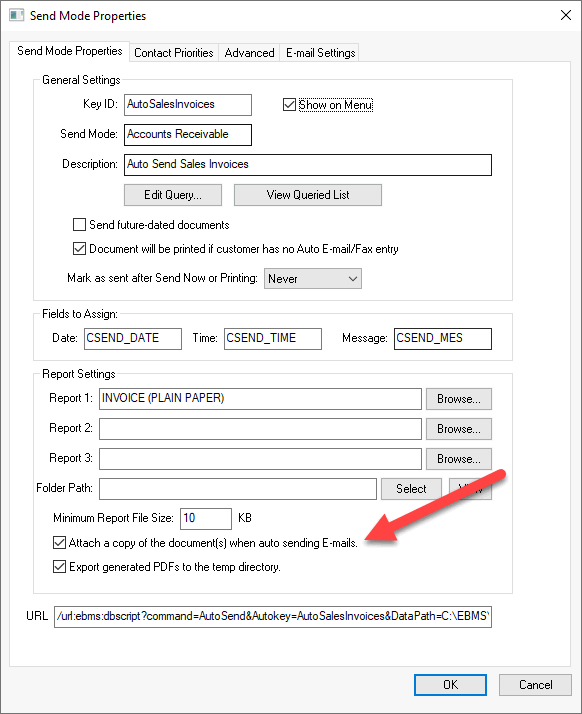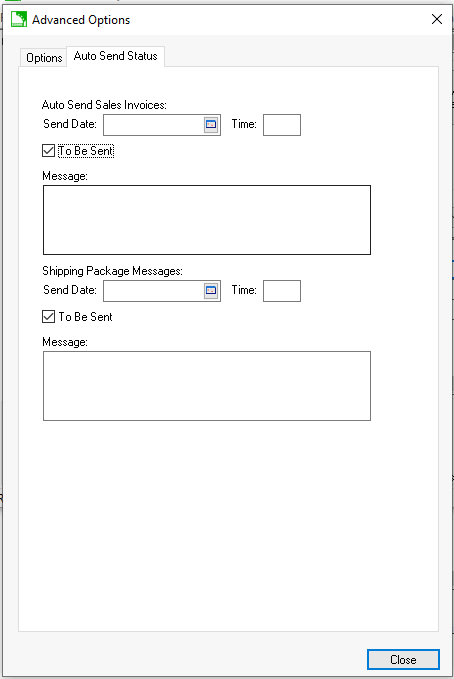Select File
> Auto Send Options > Auto Send Modes from the main EBMS
menu to open the following list:
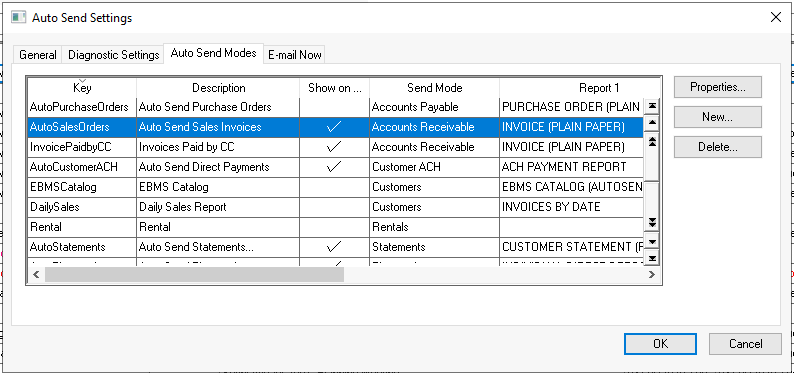
Click the New
button to create a new Auto Send
Mode and open the following dialog or select an Accounts Receivable
Auto Send Mode and click the
Properties button. Continue
with step 6 if the mode has already been created:
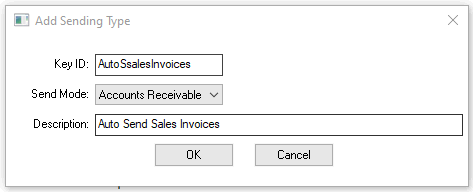
Each Auto Send Mode requires a unique Key Id. This Key ID should be a simple descriptive code that does not include spaces or symbols.
Select the Accounts Receivable Send Mode option as shown above.
Enter a short Description of the auto send mode type. This description should clearly describe the mode process. Note that this text is used as the EBMS menu label. Click OK to continue.
Configure the Send
Mode Properties as shown below:
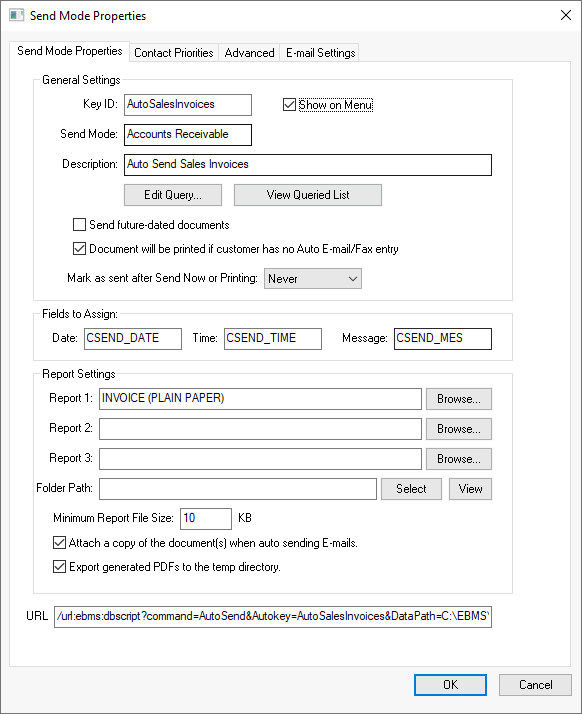
Enable the Show on
Menu option to display the Accounts Receivable Auto Send mode
on the EBMS > Sales menu.
Disable this option if Auto Send is launched using the Task
Scheduler App.
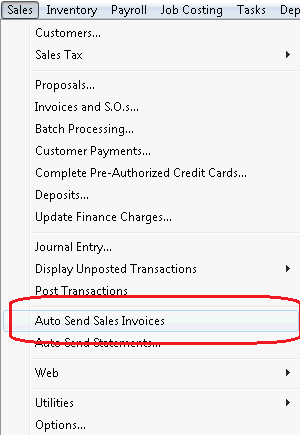
Click on the Edit
Query button to select the
group of sales orders or invoices to be sent as shown below:
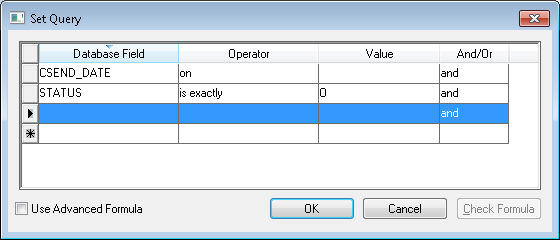
The query example shown above will send all sales invoices with a Status of 'O' (outstanding invoices)
that have not been previously sent. Review [Main]
Technical > Set Query Options for more details on creating
query expressions. Click the OK
button to save.
Click the View Queried
List to view all sales invoices that will be sent based on
the current query setting as shown below:

The Current Queried List lists all sales orders or invoices that match the query and that have not been previously sent. The Send Date within the sales invoice must be blank and the Status must be set to O to be included in the query.
Click the Purge button to populate the Send Date for all invoices listed, removing them from the query. Use the Purge button to remove past invoices from the query. A purge is often required when a new query is created. Click the Close button.
Enable the Document will be printed if customer has no Auto E-mail/Fax entry option to print documents for customers without the settings required to email a sales order or invoice. Review the following Customer Configuration setting for instructions on setting these options within a customer record.
Select one of the following Mark as sent after Send Now or Printing options:
Select Always to mark a document as sent after the Send Now Tool is used to auto send a document.
Select Ask To to prompt the user after the Send Now Tool is used to send a document.
Select Never to resend the document after Send Now Tool is used. This option is useful if the user is sending a sales document using Auto Send but the document needs to be resent to the designated email in the auto send batch.
Maintain the default values within the Fields to Assign settings since they are advanced settings.
Enter the desired sales order or invoice report into Report Settings. This report should be a sales order or invoice form. Click Advanced to configure the exported PDF Attachment Name.
Review Auto Send Additional Documents to include other reports to this E-mail by setting the Folder Path.
The Minimum Report File Size setting: This feature allows you to stop any sends on export files that are below a certain file size. This value should be set at about 10K less than the average exported pdf file size to prohibit blank reports to be sent as an attachment.
Enable the Attach a copy of the document when auto sending E-mails option to include a easy to print PDF copy of the order or invoice. Disabling this option will only communicate with the customer without any attached documents.
Disable the Export generated PDF's to the temp directory option to record a copy of the document to the shared Export Folder identified in the Auto Send Settings > General tab. Enable this option only if the documents should be copied to the computer's temporary directory.
The URL can be used to schedule the sending of the documents daily without requiring the user to launch the utility. Review [Main] Technical > Automate using Task Scheduler App for instructions to use the URL address.
Click on the Contract
Priorities tab as shown below:
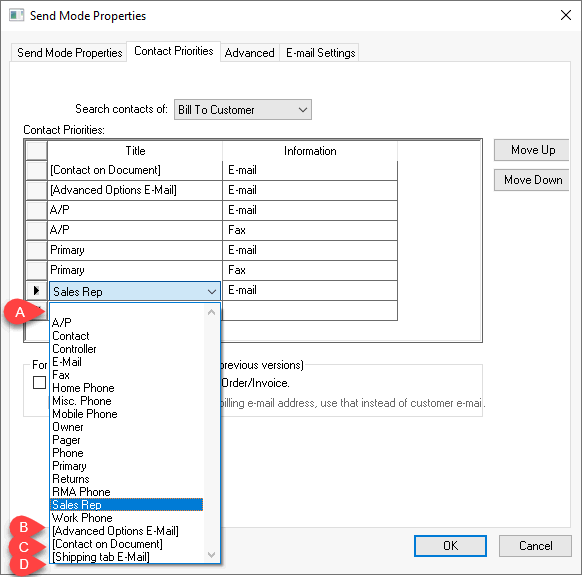
Select the Auto Send recipient which can be derived from the Bill To Customer or the Ship To Customer.
Enter the contact Title and Information for each recipient option. Review Contact Priorities for configuration details on these important recipient settings.
Most of the Title options are contact types within the Contacts sub-tab of the customer's General tab with the following exceptions:
The (Advanced Options E-Mail) is the email that is recorded within the from the sales invoice menu.
The (Contact on Document) option will send an email to the Bill To Contact listed on the Contacts tab of the invoice.
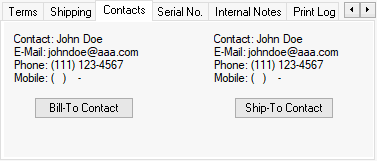
Use the (Shipping tab E-Mail) to AutoSend to send to the E-mail listed on the Shipping tab of the sales invoice. Review Freight and Shipping Tools > Shipping and Tracking Freight for details on the content of the Shipping tab.
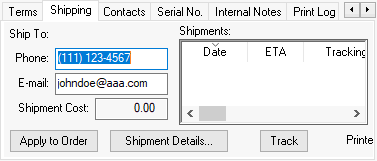
Enable the For ’E-mail’ type, give priority to the E-mail address on the Sales Order/Invoice switch to give priority to the E-mail address that is stored on the Sales Order or Invoice. Go to View > Advanced Options to view or set the E-mail setting within the sales order. When this option is disabled, Auto Send will only use the Sales Document E-mail address when there is no valid Auto Send contact information on the Customer record. In all situations, Auto Send will use the Sales Order E-mail address if there is no other contact information available. Note: this option is only valid if an E-mail or Auto E-mail is included within the Contact Priorities list.
Click on Advanced for additional settings:
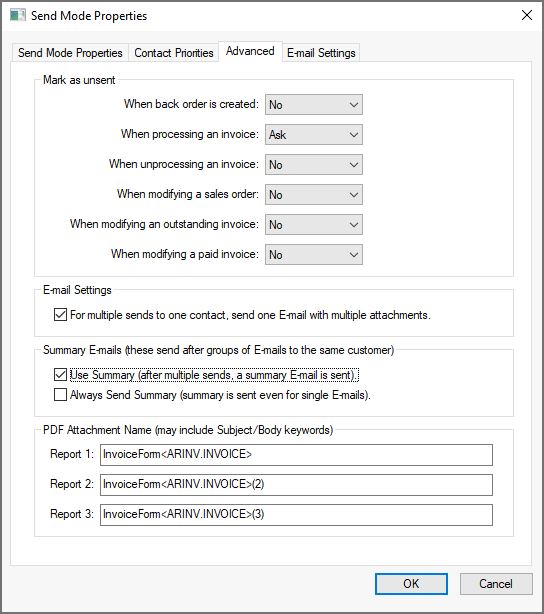
Configure the Mark as unsent options to change the status after a document has already been sent. For example, the When processing an invoice is set to Ask the system will prompt the user only when the invoice is being reprocessed. The following data entry list identifies the changes that determine when a sales order/invoice is modified:

Enable the For multiple sends to one contact, send one E-mail with multiple attachments option to group attachments (sales orders or invoices) for an individual customer into one E-mail. A separate E-mail will be generated for each document if this option is disabled. Disable this option if the contents of the form are included in the body of the E-mail.
Enable the Use Summary (after multiple sends, a summary E-mail is sent) option to send a summary after a group of E-mails have been sent to a single customer. The normal recipients (to: and cc: according to the contact priority list) get the summary, as well as the summary recipient. The only time a summary is not sent, is if a single invoice being sent and the Always Send is enabled.
Disable the Always Send Summary (summary is sent even to single E-mails) option if a summary is not required if the customer only received one e-mail. This setting has no effect if the previous Use Summary option is disabled. Click OK to save.
Set the PDF Attachment Name created by the reports configured in the Send Mode Properties. User defined file names can be set for each of the corresponding reports set in the main property tab described previously in this section.
Complete one of the following methods to launch the process to auto send a batch of sales orders or invoice:
By selecting from the main EBMS menu if the Show on menu is enabled
Automatically send using the Task Scheduler App: Use the URL text located at the bottom of this dialog to configure the Task Scheduler App. Review [Main] Technical > Automate using Task Scheduler App for instructions to send rental contacts on a daily basis.
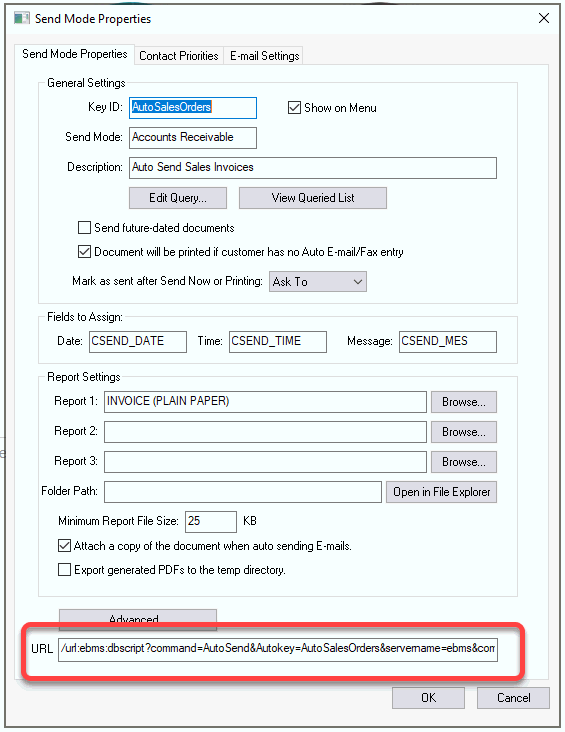
Click on the E-mail Settings tab as shown below:
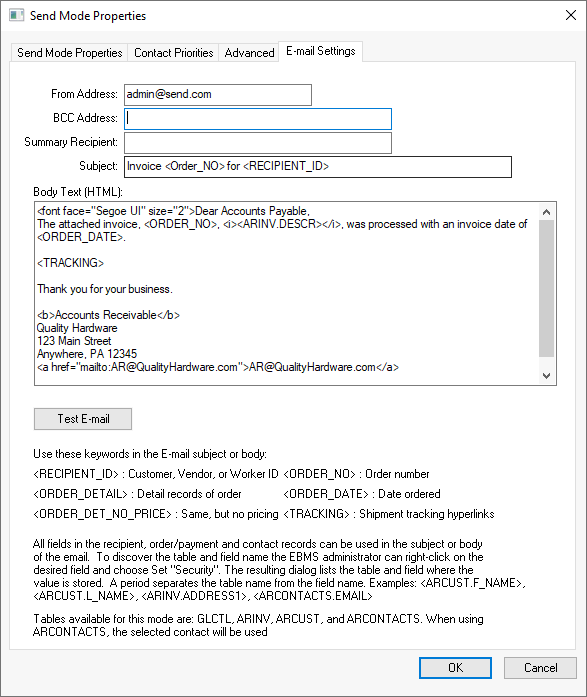
The E-mail Settings determine
the details of the e-mail document that will be automatically sent.
The recommended From Address is to match the From Address entered within the . This address can be a noreply address if no response is desired from the Auto Send e-mails.
Use the BCC Address to send a copy of all e-mails to the employee/department so the accounting staff can verify the successful sending of the orders or invoices.
Enter an appropriate Subject line for the e-mail broadcast.
Enter the appropriate Body Text using HTML or plain text syntax. The keywords list located at the bottom of the dialog can be used within the e-mail body. Note that line break tags (<br>) may cause extra lines in the E-mail.
The Test E-mail settings is a simple feature that can send a single test e-mail to a specified e-mail address as shown below.
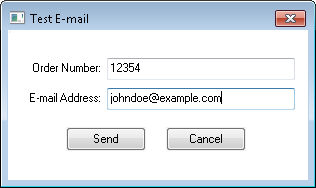
Review the Test Mode section for details on testing the e-mail creating and reviewing the e-mail result.

